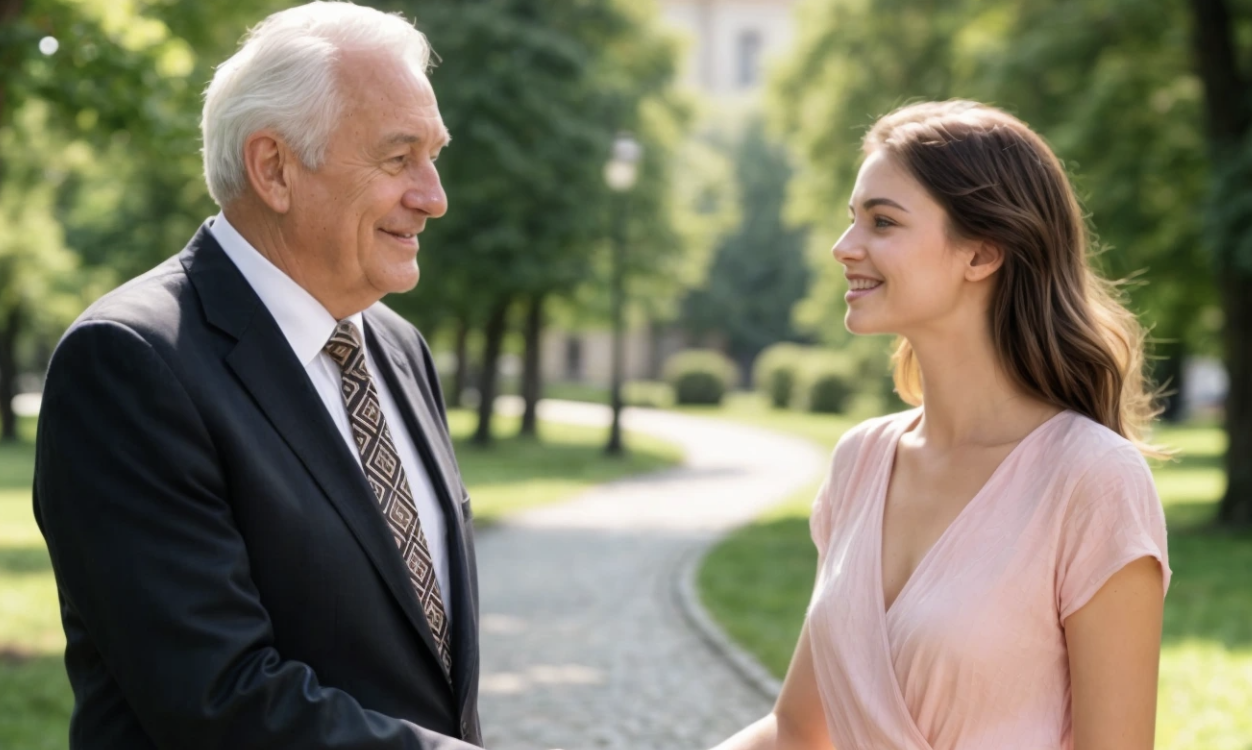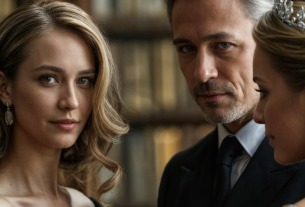My childhood unfolded in silence. Not the silence you find in libraries or morning forests, but the kind born of constant tension—the need to keep quiet so as not to betray something that wasn’t supposed to exist. We lived in an old house on the edge of the city, in a neighborhood where the asphalt crumbled underfoot and the neighbors knew everything about each other—except the most important thing. Mom worked as an accountant at a small firm, earned a modest salary, took public transport, and never complained. She would say, “We live modestly, but honestly.” I believed her. And I loved her for that resilience, for her quiet, unbending pride that was worth far more than any wealth. Every look of hers, every touch told me there are things in this world that money can’t buy, and our love was one of them.
Dad left when I was five. He didn’t leave—he disappeared. One evening he went out to take out the trash and never came back. Mom didn’t cry in front of me, but I heard her at night—quiet, stifled sobs, as if she was afraid of waking even the walls, as if the very silence of our home was fragile and could shatter at any loud sound. Later she said he “couldn’t handle it.” She didn’t specify what exactly he couldn’t handle. I thought it was some kind of illness, that he’d caught it like the flu and simply couldn’t be with us anymore. Only years later, looking into her tired but kind eyes, did I understand: he couldn’t handle the truth, couldn’t bear the weight of the honest, poor life she had chosen for the two of us.
By the standards of the world I grew up in, Mom and I were poor. I didn’t have trendy sneakers; I wore sundresses remade from her old dresses, and for my birthday I got books from the used bookstore. But I wasn’t ashamed. Mom knew how to turn poverty into dignity. “Money isn’t the main thing,” she’d say, stroking my hair. “What matters is being a decent person. What matters is staying yourself, no matter what.” I memorized that like a prayer, like a set of rules by which our little universe lived—two rooms and an endless mutual devotion.
At twenty-two I married Mark. He was an engineer at a factory—smart, calm, with warm eyes and a habit of reading me Brodsky’s poems before bed. He wasn’t wealthy—he had a one-room apartment, an old car, and a loan for renovations. But he was kind. At least that’s how it seemed then, in the happy haze of those first months when the future looked endlessly bright and cloudless. He knew my parents were “penniless.” I didn’t hide it. On the contrary, I was proud of how Mom and I had survived, how we’d supported each other through the hardest times.
But sometimes Mark let slip barbed remarks that pierced my heart like fine needles.
“Your mother can’t even afford a new handbag,” he’d say when we argued about something trivial.
Or, looking at an old photograph:
“Good thing your father ran off—with an income like that he’d only have dragged you down, like a stone around your neck.”
I kept silent. I thought he just didn’t understand. That he’d been raised in a different environment—where status is valued over character, where the wallet speaks louder than the heart. I believed our love could melt that ice of misunderstanding.
Mom died suddenly. A stroke. One morning she simply didn’t wake up. I stood by her bed, holding her cold hand, and felt the last bastion of my world collapse, the ground give way beneath my feet, leaving only emptiness and an unbearable silence that settled over my life forever. The funeral was modest. The neighbors came, two of Mom’s friends, the local GP. Mark came in a suit but watched it all with faint irritation—as if this were an obstacle to his workday, an annoying hiccup in his carefully scheduled life.
A week after the funeral, when the pain was still raw and sharp, a notary visited me. His suit was impeccable, his beard neatly trimmed, and he spoke as if every word had been weighed on golden scales. He introduced himself—Mikhail Stanislavovich, a trusted representative of the family. I didn’t understand what family he meant until he said a name that meant nothing to me.
“Your grandfather, Viktor Ivanovich Zimin, left you an inheritance.”
I laughed. First from amazement, then from pain, from the absurdity of it all.
“You’re mistaken. I don’t have a grandfather. My mother… she was an orphan. She always told me that.”
The notary smiled gently, and a shadow of regret flickered in his eyes.
“No, Sofia Viktorovna. Your mother was the daughter of Viktor Zimin. An oligarch. Owner of the Zimstroy holding, a shareholder in three banks, holder of properties in London, Monte Carlo, and on the Côte d’Azur. He died three years ago. But he left a will. And you are his only granddaughter.”
I couldn’t breathe. The room swam before my eyes. Everything I knew about my origins collapsed in five minutes. Mom… my modest, quiet mother… was the daughter of one of the wealthiest men in the country. Why did she hide it? Why did she live in poverty, denying herself everything? Why did she let me grow up in a world where we were considered nobodies, where I’d heard whispers behind my back so many times about the poor girl and her unfortunate mother? The notary handed me a folder. Inside were documents, safe-deposit keys, bank statements, a list of assets. And a letter. From Mom.
“Sofia, if you’re reading this, it means I’m gone. Forgive me for not telling you the truth. I left my father when I was seventeen. He wanted to marry me off to his partner’s son—for money, for connections, to expand his empire. I ran away. Then I had you. He tried to find us, offered millions. But I didn’t want you to grow up in that world—a world of lies, intrigue, betrayal. I wanted you to be free. To love not for status but for the soul. Forgive me for depriving you of luxury. But I gave you honesty. I hope you’ll understand me. And forgive me… for the fact that now you will have to decide who to be: an heiress or a human being.”
I cried for two days. I sobbed as I hadn’t even at her funeral. They were tears not only of loss, but of confusion and fear in the face of the truth that had crashed down on me. At first Mark was silent, then he started asking questions. Cautiously, at first:
“Is it true? Are you serious?”
Then insistently:
“How much? What are we talking about?”
And then—greedily:
“What are you going to do with the money? We need to re-register everything right away, find good lawyers!”
I didn’t answer. I didn’t know yet. My world had turned upside down, and I needed time to find a new point of balance.
But a week later everything changed. Mark began to “court” me. Not like before—with books and poetry. Now he brought me coffee in bed, stroked my hair, said, “You’re so strong, Sofia… so smart…” He started calling me “my queen.” He offered massages, dinners at expensive restaurants I hadn’t been able to afford before. He began praising my “noble posture,” “aristocratic features,” “innate taste.” I looked at him and didn’t see love. I saw calculation. I saw a new, unfamiliar fire in his eyes—the fire of greed and the vast, suddenly opened possibilities.
One evening he asked, hugging me with an unnatural tenderness:
“You’re not going to share the inheritance with anyone, are you? You understand we’re a family now. My interests are your interests. We have to be a single whole.”
“You mean—your debts are now mine?” I asked quietly, looking off to the side.
He faltered, let me go, and walked to the window.
“Well… I mean, we can start a new life. A completely different one. We’ll buy a house. Maybe even abroad. You deserve better than this… Khrushchyovka. You were born for more.”
“And you?” I asked, my voice cold. “Do you deserve this new life?”
He didn’t answer. But something flickered in his eyes—not love, not care. Pure, unvarnished greed. That evening, for the first time, I thought: what if he married me not because he loved me, but because he saw in my poverty a convenient wife? Someone easy, grateful, undemanding of luxury, someone he could control?
The next day I decided to test him. I said the lawyers had found an error in the will. That other relatives might contest the inheritance. That I might not get anything, that it had all been a cruel mistake.
Mark turned pale. His face became a mask of disappointment and fear.
“What do you mean—nothing?” he whispered, his voice trembling. “That can’t be…”
“It can,” I said, watching his every emotion. “We might have to return everything. Or divide it with distant relatives who’ve already asserted their rights.”
He was silent. Then he stood up, paced the room, stopped at the window, his fists clenched.
“Well… we’ll manage,” he said uncertainly, without a hint of warmth. “We have each other. That’s what matters, right?”
But his voice lacked its former confidence. There was only fear. Fear of losing what he hadn’t yet received but already considered his by right.
Two days later he began to grow cold. He stopped kissing me goodnight. He stopped asking how my day had gone. Once I overheard him on the phone with a friend, thinking I was in the bathroom:
“What a fool… thought she’d get rich and everything would take off. And now it turns out the whole thing’s hanging by a thread. Nothing but problems. Maybe it’s not worth holding on to her… Easier to find another option.”
I didn’t say a word. There was no anger, no resentment—just bitter disappointment and emptiness. I simply packed my things into an old suitcase and left while he was at work.
He didn’t try to stop me. He didn’t call. He didn’t write. His silence said more than any words.
I didn’t sell the apartment. I didn’t rent a mansion in a prestigious neighborhood. I transferred a significant part of the funds to charity—to animal shelters, homes for the elderly, children’s hospitals. I put the rest into reliable funds so it would work and do some good. And I left. Not for Monte Carlo. Not for London. For a small town on the shore of Lake Baikal, where there was no Wi-Fi, where people drank tea from a samovar and knew each other by name, where time flowed slowly and thoughtfully.
There I met Leonid. He was a forester. He was thirty-five. His hands were calloused, his gaze calm and deep, and he had a habit of keeping quiet when there was nothing to say. He didn’t know who I was. He didn’t know I had millions. He only knew that I’d arrived alone, with a suitcase and a book by Chekhov, and that there was a sadness in my eyes he seemed to understand without words. He helped me find a place to live—a small house by the lake. He brought firewood, fixed the stove, showed me where the mushrooms grew and which birds sang in the mornings. We didn’t kiss for a month. We just talked. About books. About the stars. About how last year a mother bear brought her three cubs to the river and he watched them all morning. He never asked where I got the money for rent. He didn’t pry into what I’d done before. He just was there. His presence felt as natural and necessary as breathing.
One evening, sitting on the shore and watching the sunset, I asked him:
“Aren’t you afraid I’ll leave? What if I get bored of this quiet?”
He looked at me as if the question were strange and smiled gently.
“Why would you leave? You’re happy here. I can see it in your eyes. They’ve become calm.”
“What if I’m not who I seem?” I pressed. “What if I have a past I don’t talk about?”
“You are who you seem,” he said simply, and his words sounded like a final verdict. “There’s nothing else I need to know. You are you.”
We married a year later. In the local church, small and wooden. No guests, no lavish dress, no fireworks. Just us, a kind, gray-haired priest, and the wind off the lake tugging at the hems of our simple clothes. I still haven’t told him about my grandfather. Not because I’m hiding it. It just doesn’t matter. He loves me not for what I have. He loves me for who I am. And in that simplicity there was a depth, a trust I had never known.
Sometimes, when we sit by the fire and the flames cast dancing shadows on his face, he lays his head in my lap and says softly, almost in a whisper:
“You’re my greatest gift. The greatest miracle of my life.”
I stroke his thick hair, feel the warmth of his body, and think: Mom, you were right. You were right about everything. Honesty is more precious than luxury. And love is the most precious thing of all.
Three years passed. One day a man arrived in our town, wearing an expensive but rumpled suit. He asked the locals where Sofia lived. They brought him to me. It was Mark. He had aged. Deep bags under his eyes, gray in his hair. He stood by the gate holding a pitiful roadside bouquet of wildflowers, looking lost and broken.
“Sofia…” he said, his voice cracking. “I came to apologize. It took me a long time to get here.”
I didn’t invite him into the house. We talked outside by an old birch tree.
“I was a fool,” he said, not meeting my eyes. “I thought money solved everything. That it was the key to happiness. And then I realized: it only shows who you really are. Turns your soul inside out. And I… I turned out to be nothing. An empty place.”
I stayed silent, letting him speak.
“I lost my job. Got married again—she left when she understood I had no money, that I couldn’t give her the life she dreamed of. I… I’m alone. Completely alone.”
“And you came for me to pity you?” I asked without reproach, just to understand.
“No,” he finally looked up, and there was genuine pain in his eyes. “I came to say you were right. Back then. And to… see you happy. Truly. I heard you got married.”
I looked at him. And for the first time in all these years I felt neither anger nor resentment. Only a light, gentle pity for a man who had ruined himself.
“I’m happy, Mark. But not because I have money. Because I’m with someone who doesn’t expect me to blow specks of dust off him. He just… loves. And I love him. That’s all.”
He nodded. His head drooped, his shoulders slumped.
“I’m sorry. I know it won’t change anything.”
“I forgive you,” I said sincerely. “But don’t come back. You have your own life. Go find your way.”
He left. I watched his lonely figure slowly recede and disappear around the bend in the road that led into the big world that was foreign to me. Then I went back inside.
Leonid was making dinner. Fish soup from the lake hissed on the stove; the air smelled of fresh bread and herbs. He smiled when I came in, his eyes radiant with warmth.
“Everything okay?” he asked, knowing nothing yet understanding everything.
“It is,” I said, stepping close and hugging him. “Better than okay. Everything is just as it should be.”
Another two years passed. We had a daughter. We named her Viktoria—after the grandfather I never knew. But I haven’t told her about him. Not yet. When she’s older, I will. Not about the money. Not about the accounts or villas. About choice. About how each person can choose in life—to be a slave to wealth or its master, to be the ruler of things or their servant. I will teach her what my mother taught me.
Leonid works in the forest. I write children’s stories—about kindness, friendship, about how the real treasure is always inside us. We live modestly. We don’t have a mansion, but we have a home full of light, laughter, and understanding. We don’t have a chauffeur, but we have each other, and that support is worth more than any service. We don’t have diamonds, but we have a child’s laughter in the mornings, her first steps, and questions whose wisdom leaves us stumped.
Sometimes, when I look at Leonid—when I see him fixing the fence or rocking our daughter in his arms—I think: if I had stayed with Mark, I would have lived in luxury. I would have had diamonds, expensive dresses, trips to the world’s capitals. But I would never have known whether he loved me. Here—I know. Every day. In every gesture. In every look full of tenderness and respect. Mom was right. The main thing is to be a decent human being. And I became one. Not the heiress to a fortune, but the heiress to her wisdom and her love.
One winter, when Baikal was covered with thick, transparent ice and the sky was so clear and deep it seemed you could touch the farthest stars, Leonid asked me as he adjusted the logs in the stove:
“Have you ever regretted leaving him? Choosing this life instead of that glittering one?”
I looked at the fire in the stove, at our daughter’s face as she slept in her wooden cradle, at my husband’s hands—strong, warm, honest, bearing the marks of his labor. I let my eyes roam over our little living room strewn with books and toys, and breathed in the familiar, homely scent of our house.
“Never,” I said firmly and calmly. “Not once. Because he wanted me to blow specks of dust off him, to serve his ambitions. And you… you blow the snow off my eyelashes when we walk in a blizzard. That’s the whole difference between our worlds.”
He smiled. A quiet, happy smile lit his face. He came over, embraced me, and held me tight.
Outside the window, snow was falling—large, fluffy, endless. It settled on the ground softly. Gently. Tenderly. As if the whole vast, noisy world had held its breath so as not to disturb, not to frighten away our simple, unshadowed happiness.
And I understood completely and irrevocably: I am not an oligarch’s heiress. I am not dust on his marble floors. I am a woman who is loved not for money, not for connections, not for the past. And that knowledge, that feeling, is worth more than any fortune in the world. It warms the soul even on the coldest Baikal nights.



